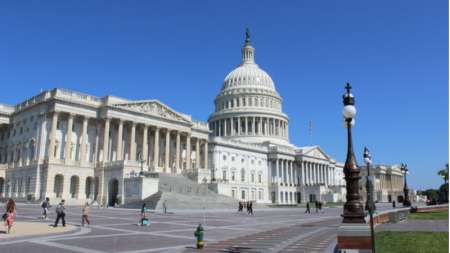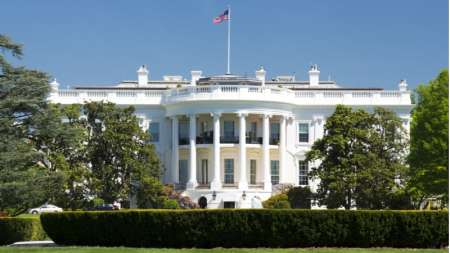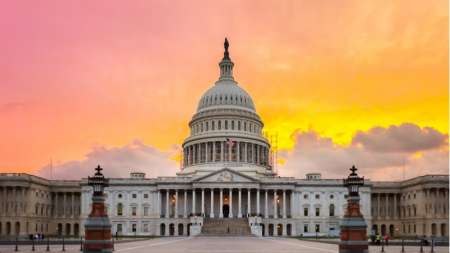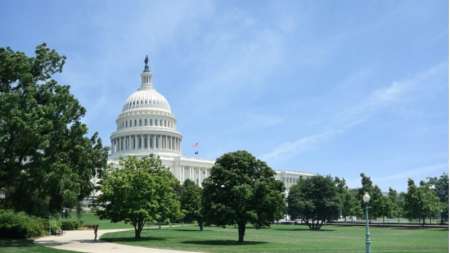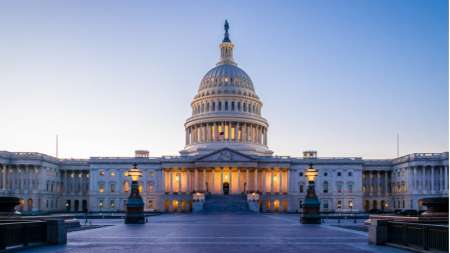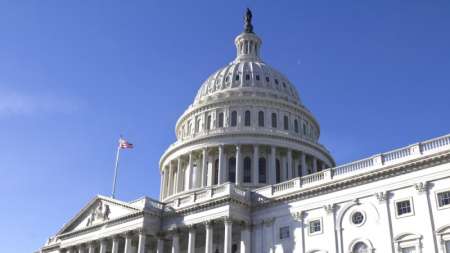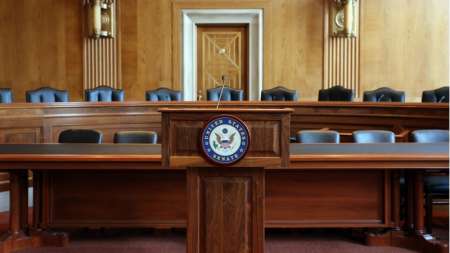The Senate passed the conferenced version of the fiscal year (FY) 2022 National Defense Authorization Act (NDAA) today, sending the $768 billion defense spending bill to President Biden’s desk for his signature. The annual defense spending bill has now been passed 61 years in a row. […]
The Senate on Dec. 14 voted to invoke cloture on the conferenced version of the fiscal year (FY) 2022 National Defense Authorization Act (NDAA), setting up a final vote on Wednesday for the $768 billion defense spending bill. […]
While a good bit of the focus on the conferenced version of the fiscal year (FY) 2022 National Defense Authorization Act has centered around the lack of incident reporting and other legislative items that were cut from the bill, the defense spending bill that passed the House of Representatives last week continues to retain a variety of important cybersecurity and tech-related provisions. […]
Senate Majority Leader Chuck Schumer, D-N.Y., expects to have a final conference agreement for the fiscal year (FY) 2022 National Defense Authorization Act (NDAA) this week, with votes potentially taking place into the weekend, Schumer wrote in a Dec. 6 Dear Colleague letter. […]
The Federal government avoided a costly shutdown, after the House and Senate both passed a continuing resolution Dec. 2 to keep the government funded until Feb. 18, 2022. President Biden signed the CR today, the White House announced. […]
MITRE Corp., the operator of Federally-funded R&D centers that aim to help the U.S. government with a host of scientific and tech research issues, is advancing a series of recommendations for congressional action on high-profile cybersecurity issues prior to Senate action beginning Nov. 29 on the FY2022 National Defense Authorization Act (NDAA) which features numerous provisions that would impact Federal cyber defenses. […]
The Periodically Listing Updates to Management (PLUM) Act, which aims to increase the transparency of senior government leaders, has been included in the fiscal year (FY) 2022 National Defense Authorization Act (NDAA), which passed the House late Sept. 23. […]
With attacks on critical infrastructure increasing, Rep. Jim Langevin, D-R.I., chairman of the House Armed Services Subcommittee on Cyber, Innovative Technologies, and Information Systems, is calling for improved security of critical systems and increased cybersecurity collaboration among the private and public sector. […]
Rep. Mike Rogers, R-Ala., is looking to introduce an amendment to the fiscal year (FY) 2022 National Defense Authorization Act (NDAA) that would increase the Department of Defense’s (DoD) budget for cybersecurity by $1 billion. […]
The Senate Armed Services Committee said on June 22 it completed its markup of the Fiscal Year (FY) 2022 National Defense Authorization Act (NDAA), which includes a $1 billion increase in funds for programs developing AI, microelectronics, advanced materials, 5G, and biotechnology. […]
The National Defense Authorization Act (NDAA) of 2021 gave the Government Accountability Office (GAO) marching orders to complete a study of the United States cyber insurance market, and GAO’s findings reinforced a recommendation by the National Cyberspace Solarium Commission for Congress to create an agency specifically tasked with collecting better data. […]
After incorporating some of the National Security Commission on AI’s recommendations in the Fiscal Year (FY) 2021 National Defense Authorization Act (NDAA), Reps. Jim Langevin, D-R.I., and Elise Stefanik, R-N.Y., hope to incorporate more of the commission’s final recommendations in the FY 2022 NDAA. […]
The White House announced the creation of the National Artificial Intelligence Initiative Office within the White House Office of Science and Technology Policy today, taking further steps to advance the research, development, and adoption of AI across the United States. […]
After an unusually noisy holiday news week, here’s a quick catch-up. After threatening to derail a combined $2.3 trillion spending bill, President Trump on Dec. 27 signed combined FY 2021 government funding and COVID relief legislation. President Trump on Dec. 31 issued an executive order that will give all Federal government civilian employees a one percent pay raise in 2021. The House on Dec. 28 and the Senate on Jan. 1 voted to override President Trump’s Dec. 23 veto. […]
Senior House Republicans pointed today to the still-unfolding situation on Russian-backed hacking of government networks via SolarWinds software to call for passage of the Fiscal Year 2021 National Defense Authorization Act (NDAA) and the cybersecurity elements that the legislation features. […]
The House of Representatives has passed the National Defense Authorization Act (NDAA) for FY 2021 today. The bill passed with a veto-proof majority, undercutting President Trump threats on Twitter to veto the ‘must-pass’ legislation. […]
Following the 11th hour exclusion of his bill to codify the Federal Risk Assessment and Management Program (FedRAMP) into law from must-pass defense legislation, Rep. Gerry Connolly, D-Va., said he’s interested in giving the measure another push after the 117th Congress begins in January 2021. […]
Cybersecurity leaders in Washington are rejoicing as the proposed 2021 National Defense Authorization Act (NDAA) includes the creation of a Senate-confirmed National Cyber Director for the executive branch, among a host of other security provisions. However, while both Senate and House leadership have signed off on the bill, its future remains uncertain as President Trump has threatened via Twitter to veto the legislation. […]
Republican and Democratic leaders of the House Armed Services Committee said today they have reached agreement on provisions of the Fiscal Year 2021 National Defense Authorization Act (NDAA). […]
The Senate approved the National Defense Authorization Act (NDAA) for Fiscal Year 2021 today in an 86-14 vote, following a White House threat to veto the legislation. […]
The House voted late on July 20 to include in the Fiscal Year 2021 National Defense Authorization Act (NDAA) legislation that would codify into law the FedRAMP program – giving the program a statutory foundation and formal standing for congressional review. […]
A new Federal Acquisition Regulation (FAR) Council rule will ban U.S. agencies from buying products or utilizing services from companies such as Huawei or ZTE starting August 13. […]
Sens. Rob Portman, D-Ohio, and Brian Schatz, D-Hawaii, said they are offering the Deepfake Report Act as an amendment to the Senate’s fiscal 2021 National Defense Authorization Act (NDAA) bill. […]
The Senate Armed Services Committee announced the markup schedule for the National Defense Authorization Act (NDAA) for FY2021 today. […]
A dozen legislative proposals designed to make the nation more resilient to a cyber attack have been submitted to congressional committees by the Cyberspace Solarium Commission, who released its report the week before Federal agencies were told to “maximize telework.” […]
The Pentagon has begun the search for a Chief Data Officer (CDO) that will report directly to the Defense Department’s (DoD) Office of the CIO (OCIO) as the department begins transitioning the CDO position to OICO. […]
The bipartisan version of the Fiscal Year 2020 National Defense Authorization Act (NDAA) offers paid family leave for all Federal employees, prevents the White House from merging Office of Personnel Management (OPM) functions with the General Services Administration (GSA), and establishes the Space Force as a new branch of the military. […]
On Dec. 6, Rep. Chrissy Houlahan, D-Penn., introduced H.R. 5353, which will establish a policy that promotes and maintains “digital and software development expertise” in the Defense Department’s (DoD) workforce. […]
The Senate version of the Fiscal Year 2020 National Defense Authorization Act (NDAA) includes multiple provisions in the bill’s report that push the Department of Defense (DoD) to make greater investments in cybersecurity and artificial intelligence (AI). […]
TechNet President and CEO Linda Moore wrote the House and Senate Armed Services Committees on Aug. 12 to raise concerns with the current draft of the FY2020 National Defense Authorization Act (NDAA). […]

